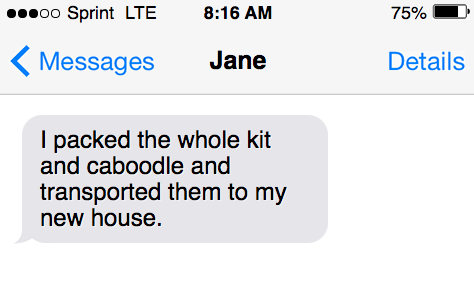What does “whole kit and caboodle” mean? Have you planned a vacation with your family by car? When you start, you will stack your vehicle with a lot of clothes. Not only clothes, but food, water, and other things in your vehicle. When you explain this to your friend, you can say that I am carrying my whole kit and caboodle with me for the vacation. By using the word whole with the idiom, you mean that you are overloading your car.
Learn what “whole kid and caboodle” means in this short idiom guide…
What does “whole kit and caboodle” mean?
Indeed, the whole kit and caboodle is a commonly used idiom in English. Nevertheless, it has a wide range of use cases in the present society. For example, a pet food brand named Purina has named one of its products as Kit and Kaboodle. The brand means to say that this food product will provide your cat with all the nutrition it needs.
When you use formal content, you cannot use this idiom. The reason is that it is typically used by people in casual conversations as it is more of a slang sentence these days. In short, the term kit and caboodle means that you are taking everything with you.
Even it means that you cover all the bases when preparing for your requirements. When this is the case with the term Kit and caboodle, the whole kit and caboodle denote a suggestion. The suggestion is that someone is overloading his/her things. Otherwise, it could be a reference to get a person to pack more items. Here, the term “Kit” denotes possessions.

Origins of the Idiom “Whole Kit and Caboodle”:
The idiom “whole kit and caboodle” was initially recorded for getting used in 1884. It was first used in the United States. You can understand what makes this idiom wholesome by understanding each word in this idiom:
- The word kit denotes a group of items. It can denote the kit used by a soldier, where he has placed all his personal belongings.
- The word Caboodle comes from the word boodle. This word was initially used in American English in the 1830s. Its purpose is to denote a group of people.
Examples of “Whole Kit and Caboodle” Used in Sentences:
Now, you know what the term “Whole kit and caboodle” mean. It is natural for humans to remember things explained with examples. The same rule applies to any new idioms you learn. ‘
Here are some sentences with this idiom as examples:
- Before washing clothes, pour sufficient water into the bucket. Only then does the whole kit and caboodle sit in a pool. Leave for around 20 minutes before washing them.
- I packed the whole kit and caboodle and transported them to my new house.
- Why does your school bag weigh so much? Are you packing the whole kit and caboodle today?
“Whole kit and caboodle” synonyms:
Some terms are similar to the idiom “whole kit and caboodle”. When you are using a casual blog, you can use the following alternatives to this idiom:
- Leave nothing behind
- Everything you own
- Take the kitchen sink with you
- Covering all the bases
- Kit and kaboodle (difference in spelling)
- The whole boodle
- The whole kit and boiling
Now, you know at what instances you can use the idiom “whole kit and caboodle.” We have been referring to this combination of words as idioms and not phrases. You might wonder why we did not call it a phrase.
A phrase is a group of words used for explaining an expression. An idiom is also an expression. But, people make it by combining words to mean something different from the literal meaning of the saying or phrase. From a phrase, you can make a literal meaning. But, when it comes to idioms, they are figurative and are not literal in meaning.
When to avoid using this idiom:
Now, with the alternatives above, you know when to use the idiom. But, you should also know when not to use it.
- If you see a person packing a single day pack in his/her handbag, you cannot express that the person is carrying the whole kit and caboodle.
- You should not use the idiom to denote light packing descriptions.
- You can use this idiom to denote someone packing things required for a challenge. You can use it to refer to someone carrying the package too long.
Is it the whole “kitten and caboodle” or “kit and caboodle?”
It is not “kitten and caboodle.” The correct spelling for the idiom is “kit and caboodle.” A kitten, as you know, is a younger version of a cat. But, when you use the word kit, it means a group of things placed in a single package.
When you are in the United States, you can easily find people understanding this idiom. But, in many other non-native English nations, they won’t understand what you are referring to.
Inside this article
Fact checked:
Content is rigorously reviewed by a team of qualified and experienced fact checkers. Fact checkers review articles for factual accuracy, relevance, and timeliness. Learn more.
Core lessons
Glossary
- Abstract Noun
- Accusative Case
- Anecdote
- Antonym
- Active Sentence
- Adverb
- Adjective
- Allegory
- Alliteration
- Adjective Clause
- Adjective Phrase
- Ampersand
- Anastrophe
- Adverbial Clause
- Appositive Phrase
- Clause
- Compound Adjective
- Complex Sentence
- Compound Words
- Compound Predicate
- Common Noun
- Comparative Adjective
- Comparative and Superlative
- Compound Noun
- Compound Subject
- Compound Sentence
- Copular Verb
- Collective Noun
- Colloquialism
- Conciseness
- Consonance
- Conditional
- Concrete Noun
- Conjunction
- Conjugation
- Conditional Sentence
- Comma Splice
- Correlative Conjunction
- Coordinating Conjunction
- Coordinate Adjective
- Cumulative Adjective
- Dative Case
- Determiner
- Declarative Sentence
- Declarative Statement
- Direct Object Pronoun
- Direct Object
- Diction
- Diphthong
- Dangling Modifier
- Demonstrative Pronoun
- Demonstrative Adjective
- Direct Characterization
- Definite Article
- Doublespeak
- False Dilemma Fallacy
- Future Perfect Progressive
- Future Simple
- Future Perfect Continuous
- Future Perfect
- First Conditional
- Irregular Adjective
- Irregular Verb
- Imperative Sentence
- Indefinite Article
- Intransitive Verb
- Introductory Phrase
- Indefinite Pronoun
- Indirect Characterization
- Interrogative Sentence
- Intensive Pronoun
- Inanimate Object
- Indefinite Tense
- Infinitive Phrase
- Interjection
- Intensifier
- Infinitive
- Indicative Mood
- Participle
- Parallelism
- Prepositional Phrase
- Past Simple Tense
- Past Continuous Tense
- Past Perfect Tense
- Past Progressive Tense
- Present Simple Tense
- Present Perfect Tense
- Personal Pronoun
- Personification
- Persuasive Writing
- Parallel Structure
- Phrasal Verb
- Predicate Adjective
- Predicate Nominative
- Phonetic Language
- Plural Noun
- Punctuation
- Punctuation Marks
- Preposition
- Preposition of Place
- Parts of Speech
- Possessive Adjective
- Possessive Determiner
- Possessive Case
- Possessive Noun
- Proper Adjective
- Proper Noun
- Present Participle
- Prefix
- Predicate



